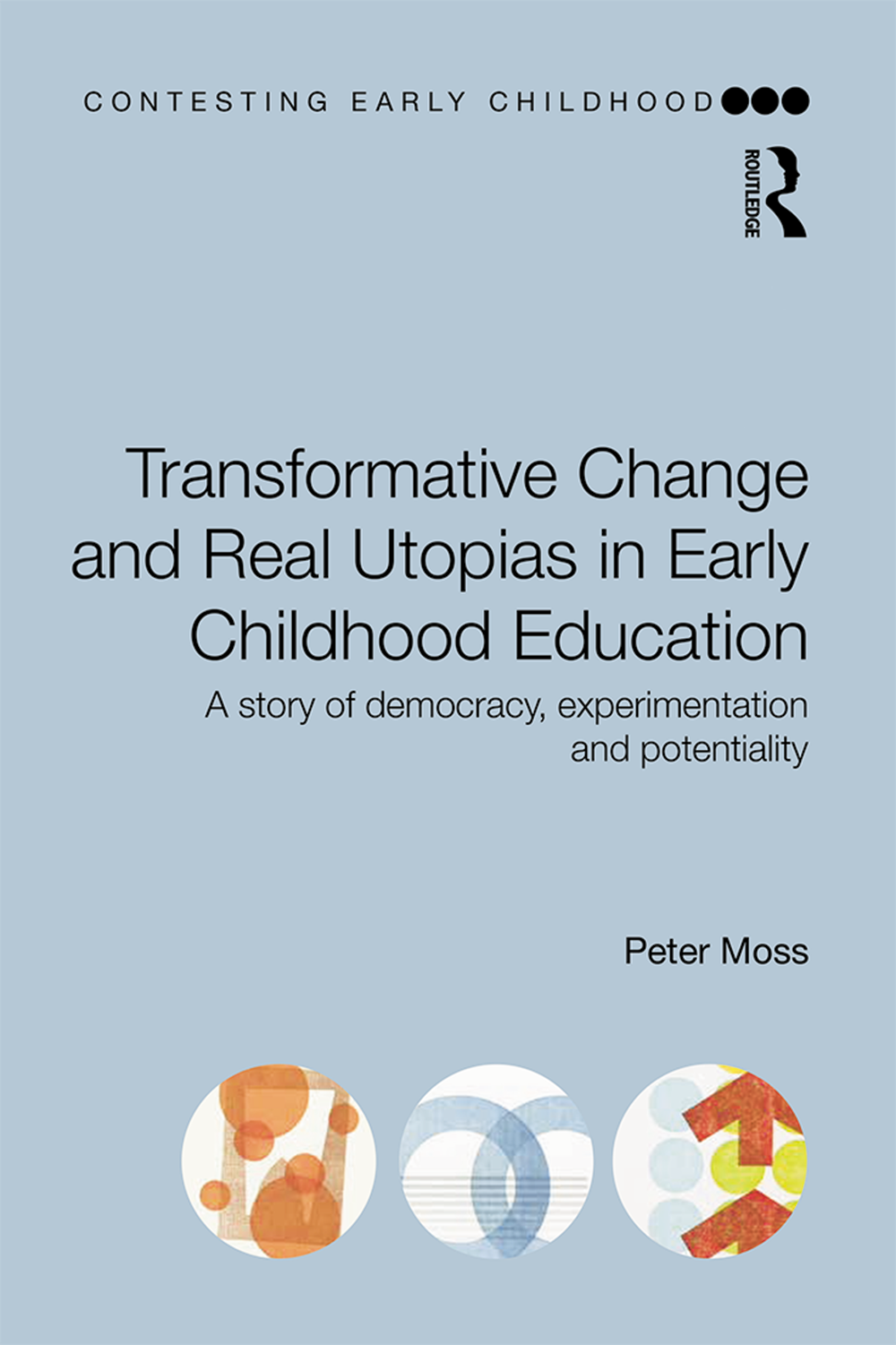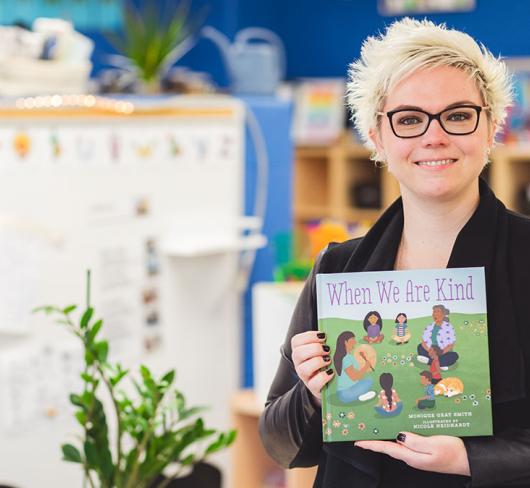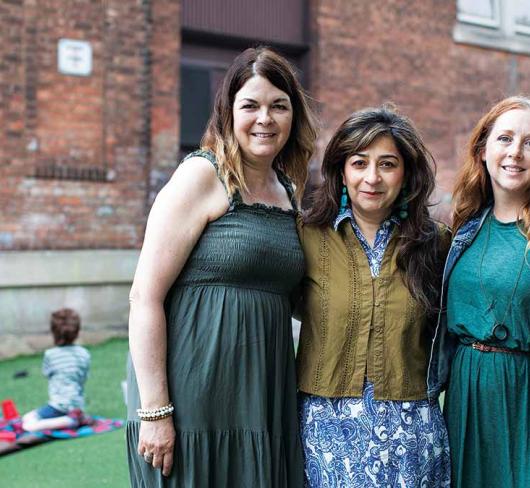
Telling a Different Story - Peter Moss’s Transformative Change and Real Utopias in Early Childhood Education: a Story of Democracy, Experimentation and Potentiality
With the Ford Conservative government putting an agenda of cuts, privatization, austerity and neoliberal thinking forward in its consultation on education, Peter Moss’s Transformative Change and Real Utopias provides a breath of fresh air, shifting the discussion away from testing and outcomes and toward democratic, experiential and transformative practices for learning in early childhood. Moss writes passionately and eloquently about how current trends, which form the dominant narrative about early childhood education, deny both children and educators so many rich opportunities for engagement, curiosity and democratic practice. Sharply critical of current language, practice and policy, he draws on his own experience of working in early childhood settings in England, Italy and Sweden.
Moss begins by noting that the world has entered “an age of ecological collapse, material contraction and social and political unraveling” and he states that not addressing this, investing in the future by preparing children for the global race without interrogating what the future might be, “just will not do.” We need to shift the way we think about and develop policy around education.
Early childhood education policy has garnered a high profile lately; every think tank, government and international organization, including the Organization for Economic Cooperation and Development, recognizes that investment at this level will yield high returns. This framing of education ignores the subjective aspects of quality learning. The story as it is currently being framed, Moss argues, can be summarized by the following equation: early intervention + quality = increased human capital + national success. His thesis is that this neo-liberal version of education and its outcomes is troubling. It presents itself as if it were natural and neutral and marginalizes other more transformative and democratic possibilities. This dominant story imposes what Moss calls a Dictatorship of No Alternatives. It is related to a concept, he argues, that was favoured by Margaret Thatcher and other right-wing politicians seeking to impose their views and head off democratic debate.
Moss sets out to convince us that the current dominant story in early childhood education lacks imagination, curiosity and originality. “Told repeatedly, the story of high returns has drained education of its potential to amaze and surprise, to invoke wonder and passion, to emancipate and experiment…This is a story told in the desiccated language of the managerial memo, the technical manual and the financial balance sheet.” We repeatedly hear the clichéd vocabulary that includes evidence-based, investment, outcomes, returns, assessment scales, human capital. The language in this story, Moss argues, plunges the vibrant subject of early childhood education into a “one-dimensional linear reductive thinking that excludes and closes off all other ways of thinking and doing.”
This sounds very similar to the deep concerns we hear elementary teachers voicing about the current pressures for an “achievement agenda,” which assesses quality of education and student learning through a one-dimensional tool. Successive governments in Ontario have argued that large-scale assessments such as EQAO are useful tools to monitor a few variables. In this story, the standardized test collects data to help determine the effectiveness of Ontario’s education system; meanwhile both parents and teachers are concerned about the timelines, the validity of the test, the uses of the data collected, security and the disproportionate focus on literacy and numeracy at the expense of physical education, the arts, science and technology and social studies. Tens of millions of dollars are spent on this test when experts in the field have consistently argued that we have a critical need to invest in more supports for students with special needs, greater access to specialist teachers, smaller classes and stronger focus on equity and inclusion.
Moss goes on to discuss the reason why the current dominant narrative about education has such a powerful hold on us today. He writes, “The story of neoliberalism is a story about everything and everyone, offering a comprehensive worldview about how all human life can and should be reduced to a set of economic relationships and values. In its essence competition and markets are ‘unparalleled information processors’ – markets know best and inequality is the basis, the ‘driver of competition.’” Here Moss unpacks the often-used term, “quality.” He reminds us that language matters. The word quality is not neutral. He warns that using this term masks the political nature of our work in the early years. Rather than debating what we think is good or desirable, we “take the easy way out and slip into using the shorthand of ‘quality’ and by so doing delegate experts to tell us what we should think and do.” Moss believes it is not possible to square context, complexity and multiple perspectives with a need for a standardized measure of effectiveness in producing standardized outcomes. He asks his reader to consider what the fundamental values of education should be. He makes the thought-provoking argument that education is defined as a political practice involving choices that need to be made between conflicting alternatives. Promoting an image of the child, the role of the educator, the relationships built with families and the place of the school in community are all choices that need to be made and politically charged. Moss goes on to posit that democracy and experimentation are the most fundamental values of education.
For teachers in the early years, chapter six takes on a special significance because Moss immerses the reader in an example of pedagogical work that boasts of the unlimited potentiality of children. A pedagogy of listening and relationship blooms in a Swedish early years setting that documents “The Crow Project.” Illustrations and examples help consolidate our understanding of how experimentation and democracy in the early years classroom can look. The teacher immerses herself in her role as a researcher, learning how the students are learning, creating a chronicle of the growth in skill, knowledge and understanding. She shares this documentation with the children and then the way forward becomes responsive to their needs, interests and desires. Moss follows this with a chapter on how to redesign institutions and discusses what conditions enable the story of democracy, experimentation and potentiality to flourish. He digs into the viability of this framework for education, providing a recipe for success with seven ingredients: early childhood centres (which must be accessible in every way), early childhood workforce (populated with professionals who focus on ages 0-6 and have parity with all other teachers since younger doesn’t mean lesser), the educative commune (education in the early years is the right and the responsibility of every citizen), academia (maintaining a standard for Bachelor or Master’s level education working in a reciprocal relationship between theory and practice for those in the field rather than a strictly workplace-based system of apprenticeship), national government (which necessitates a national policy framework to avoid inequalities and dysfunction across a nation), time (for thought, for listening, for dialogue, for reading, for research for professional development – that is, time for pedagogical documentation) and finally, evaluation and accountability.
The last ingredient, evaluation and accountability, speaks to us in Ontario now as we think about the debate surrounding EQAO and the Conservative government consultations intent on crowd-sourcing best educational practices. Moss clearly agrees that evaluation and accountability must play an important role in the education system. He challenges us, however, to ask, “How do we understand these concepts? For what purposes are they undertaken? What organizations and processes are involved?” Professional accountability leaves the field to professional review and self-discipline. Professional bodies set up a code of standards for behaviour often monitored by peers. “The language of quality and high returns in education today,” Moss writes, “takes us instead, into the field of managerial accountability, which is about performance, measurement against predetermined standards, targets or other outcomes, with goal-setting and measurement assumed to be objective, technical, transparent.” Moss raises the spectre of merit pay based on outcomes as a logical result of this ‘tyranny of metrics,’ which leaves no room for immeasurable developments, unexpected consequences, surprise and wonder.
Plural values, multiple perspectives, context and complexity, professional judgment, local knowledge and the notion of practice as a process of research and learning are also lost under the current model. Moss believes we can strive toward a democratic judgment of value that calls for qualities of reflection, dialogue and practical wisdom. When speaking in Toronto in July 2018, Moss told a packed audience of early childhood educators that Loris Malaguzzi, a key figure in the Reggio Emilia early childhood approach of northern Italy, described standardized evaluation as a “ridiculous simplification of knowledge and a robbing of meaning from individual histories.”
Moss concluded that lecture in a manner similar to the tone of this book. He sees education as a political practice that requires political choices made in response to political questions we must ask ourselves.
The final chapter of this book is about why transformation is possible. Moss urges readers to think historically:
See the present as a moment in time and what seems … inevitable today may have seemed inconceivable but a few decades ago – and could seem so again in a few decades time. Crises create fertile ground for change and there can be little doubt that we are living in a time of deepening and converging crises, which will see today’s dominant stories losing their power making room for others more attuned to humankind’s condition and hopes.
While his criticisms of the current dominant narrative are deep and worrisome, it is important to recognize that Peter Moss remains as hopeful as the title of his book suggests. He does not see “transformative change” as creative destruction, discarding the past and present, nor is it a big systemic alternative overcoming the current system with sweeping change. Again, we return to that idea of telling a new story. We must adopt a new way of thinking about education. The past and present are not discarded but “valued for the contributions they can make to the future.” Readers involved in any part of the education system in Ontario today cannot read this book without thinking about their own ideas, their values and how they hope to shape their corner of the system.
Francesca Alfano is a member of the Hamilton-Wentworth Teacher Local.

